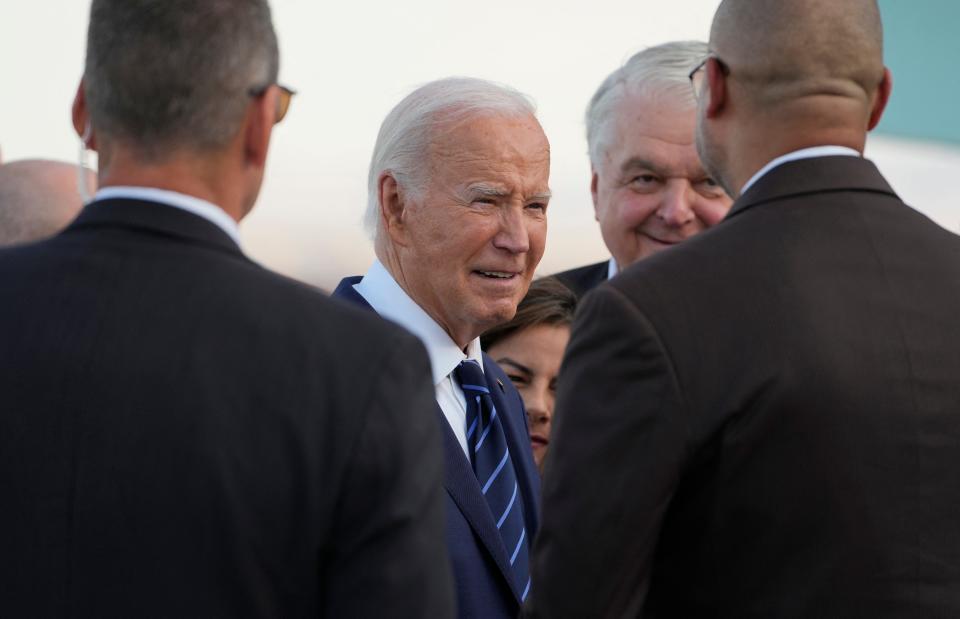Biden admits putting Trump in 'bull's-eye' was a mistake. It's a little late for that.
The gunman who attempted to assassinate former President Donald Trump on Saturday is to blame for his horrific actions, but the violence didn't occur in a bubble. Our political environment is polarized, toxic and full of damning rhetoric.
Democrats have demonized Trump since 2016, and the harshness of their rhetoric, starting with President Joe Biden, has ramped up in recent months.
While correlation doesn't equal causation, no one should ignore the ugly rhetoric that preceded the assassination attempt on Trump and has continued in some quarters even after Saturday.
Political leaders are being hypocritical

On July 8, on a phone call with donors, Biden said, "We’re done talking about the debate, it’s time to put Trump in a bull's-eye."
His comment was ignored before the assassination attempt. It gained widespread attention only after a gunman wounded the former president, killed an innocent bystander and seriously wounded two other people.
During Biden's interview with NBC News' Lester Holt on Monday night, the president walked back his bull's-eye comment, saying it was a "mistake." But he also didn't come close to an apology for using a violent reference about his political opponent in an already heated time in history.
Biden's admission of a "mistake" also came much too late − a week after he made the comment and two days after the attempted assassination.
Trump stood defiantly after shooting. America also needs to stand against violence.
The bull's-eye comment fits a pattern with Biden. In a July 5 post on X, Biden said that Trump "could become the dictator he promised to be." On June 28, he posted that Trump was "a genuine threat to this nation." "He's literally a threat to everything America stands for," the post concluded.
Biden is far from the only progressive who resorted to supercharged rhetoric before Saturday, and after.
In the wake of the shooting, Rep. Bennie Thompson, D-Miss., posted on X, "There is no room in American democracy for political violence." Yet, a member of his staff − after the attempted murder of a former American president − posted this on social media: "I don't condone violence but please get you some shooting lessons so you don't miss next time oops that wasn't me saying that."
Thompson, the ranking Democrat on the House Homeland Security Committee, promptly announced that the staff member was no longer employed by his office.
Even in the entertainment world, the violent rhetoric against Trump didn't stop after Saturday. Musician Kyle Gass said "don't miss Trump next time" on stage Sunday during a Tenacious D concert. Actor Jack Black canceled the remainder of the band's concert tour because of the comment.

Media outlets contribute to anti-Trump rhetoric
I'm a Republican who repeatedly has said that I don't think Trump was the best choice to represent the GOP. Leftists have gone much further. They have demonized Trump, painting him with the same brush as the worst people in history. Here are a few examples:
On Sunday, only a day after the attempted assassination, The Atlantic published this headline, "The Gunman and the Would-be Dictator." In the column, David Frum wrote, "Fascism feasts on violence," in a reference not about the assassination attempt but about its target.
In June, The New Republic's cover story featured a characterization of Trump's face with Hitler's infamous mustache. "Yes, That's Right: American Fascism," the headline read.
A December Washington Post headline stated, "Yes, it's okay to compare Trump to Hitler. Don't let me stop you."
Democrats are in chaos over Biden. It shows they're not ready to lead America.
In 2017, the German magazine "Stern" depicted Trump giving the Nazi salute and described how "Trump stirs hatred in America."
In 2017, the cover of another German magazine, Der Spiegel, featured a drawing of Trump with the notorious Ku Klux Klan hood and mask. "U.S. President Donald Trump is a racist and a hate preacher. It's time to stop trivializing the immense damage he is causing," the subhead read.
The cover of a March 2018 issue of The Economist showed a grenade with Trump's face etched into it. The story dubbed him a "threat to world trade."
A 2018 New York magazine cover showed a photo of Trump with his nose enlarged to look like a pig. "It's the Corruption, Stupid," the headline read.
Trump is a fascist, akin to Hitler and a pig, according to these supposedly respectable mainstream media outlets.
Outlets like The Washington Post, New Republic and New York try to influence public discourse. They are showing their readers not just what to think but how to think by distributing derogatory opinion disguised as responsible journalism.
They bear responsibility for pushing the narrative, not just that Trump's policies were awful, but that he was basically Hitler.
Opinion newsletter: Sign up for our newsletter on conservative values, family and religion from columnist Nicole Russell. Get it delievered to your inbox.
What's more, these major news outlets didn't hold each other accountable for propagating these images and inflamed rhetoric. No one but conservatives and conservative media called them out for it. When they did, they were dubbed too sensitive, dramatic or just plain wrong.
Imagine if the same scrutiny that news organizations have given Trump had been applied to Biden in recent years. Just before the assassination, we saw evidence that journalists knew that Biden was struggling with mental acuity but didn't report it.
NBC News' chief political analyst Chuck Todd revealed that a senior member of Biden's Cabinet told him two years ago that the president should not seek a second term because of his age-related decline. "This is irresponsible, there is no evidence he can serve four years," Todd said after the debate. But why didn't he inform the American public of those concerns long before the debate?
On July 4, a week after Biden's awful debate performance, a New York magazine story suddenly investigated Biden's decline. The author, Olivia Nuzzi, said that she had been working on the piece since January and that the story took time to report. But somehow, miraculously, she gathered enough evidence to publish the story just after Biden publicly humiliated himself and his followers.
Biden largely has been given a pass for years for things he has said and for his visible decline. The same luxury was not granted to Trump. Quite the opposite.
It's Republicans' fault?
Some leftists have even blamed Republicans, saying it was their rhetoric that spurred the assassination attempt. ABC News' George Stephanopoulos and Martha Raddatz said Sunday that Trump and his supporters "contributed to ... violent rhetoric."
"We were just looking back this morning at some of the things that former President Trump has said, he warned last March of potential death and destruction if he were charged by the Manhattan district attorney," Raddatz said. Then she quoted Trump, "‘Now, if I don’t get elected, it’s going to be a bloodbath for the whole − that’s going to be the least of it, it’s going to be a bloodbath for the country.’ ”
Trump's rhetoric often has been indefensible, and I've called him out on it many times. But that doesn't make it OK for progressives to compare a former and perhaps future president to Hitler or to describe him as a dictator in waiting weeks before the election.
All of this raises uncomfortable questions: Will Democratic leaders and progressive journalists disavow their "Trump is a fascist and future dictator" rhetoric? Or will they stop calling for unity after an attack that has shaken millions of Americans?
They must choose one or the other.
It can't be both.
Nicole Russell is an opinion columnist with USA TODAY. She lives in Texas with her four kids. Sign up for her newsletter, The Right Track, and get it delivered to your inbox.
You can read diverse opinions from our USA TODAY columnists and other writers on the Opinion front page, on X, formerly Twitter, @usatodayopinion and in our Opinion newsletter.
This article originally appeared on USA TODAY: Hitler? Dictator? Left must own up to rhetoric before Trump shooting
